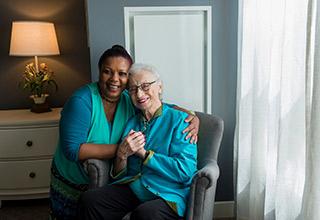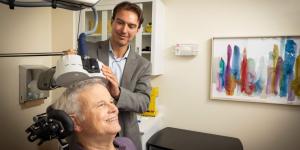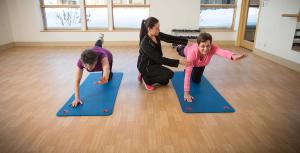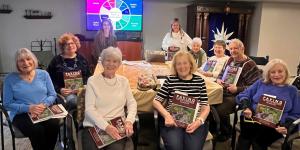How Technology Can Promote Healthy Aging
First in a two-part series about technology for seniors and how new tools can support the care of an aging loved one.
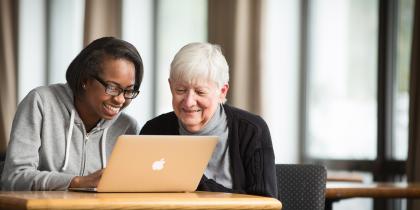
Today's seniors are embracing technology in their lives and are more digitally connected than ever. Mobile devices such as smartphones and tablets have come on strong in recent years, with seven in 10 adults in the U.S. over age 70 now using a smartphone. Apps that are available now can empower seniors to proactively engage in their own health, leading to more healthy and fulfilled lives.
We’re also now seeing an explosion of smart devices, which are electronics that can connect, share, and interact with their users and with other devices. Houses are even being built as “smart homes” with technology incorporated in every room.
In my roles as a neuropsychologist and researcher at Hebrew SeniorLife in Boston, I not only recommend ways that patients and their families can use technology to benefit their lives, I’m also working with colleagues to study what tools might be most effective in promoting health, and to design projects that use new technology to remotely gather longitudinal data. This will help us understand which biological and lifestyle factors make some individuals sustain health and well-being, and which do not.
In this two-part series, we’ll look at how technology has evolved to support older adults, and I’ll share some resources if you’re interested in trying out some of these new devices and apps.
How can technology improve the lives of seniors?
When used properly, technology empowers you to have more control over your care. Smart devices can help you monitor blood pressure, blood sugar, heart rhythm, gait, mood, cognition, nutrition, and sleep quality. They can detect problems that may go unnoticed and allow you to intervene at the right time.
Digitally tracking your health has the potential to detect when you’re at risk of getting sick. For example, recent evidence shows a three-minute task with a digital cognitive test can notice early signs of dementia.
You can also monitor other aspects of your health over time, and deepen your annual in-person health checkup with your doctor. For example, by monitoring blood pressure at home; or instead of periodic finger sticks to measure blood sugar levels, a blood sugar patch can show both the impact of certain foods and provide a timely warning to you and your doctor. Over time, this could allow proactive and personalized medical care interventions.
Technology that monitors the health of an older adult can also be helpful should you need home health care after an illness or hospitalization, which is a service that we provide through Hebrew SeniorLife Home Health. Monitoring your recovery through a combination of in-person and remote care can reduce the risk of hospitalization.
If you’re caring for an aging loved one, technology can bring peace of mind, especially if you can’t be with them at every moment of the day. Of course, any technology that tracks location or health data should only be used with the knowledge and consent of the older person.
The benefits of smart technology for seniors and caregivers
Smart devices can help older adults optimize physical and mental functions, enhance social relationships and quality of life, and support independence by providing a safe environment inside and outside the home.
Smart devices are also quite helpful for families and caregivers. They can free caregivers from physically and emotionally burdensome duties while enhancing their efficiency and improving their own quality of life.
At the same time, the use of these smart devices in aging care has the potential to improve care quality and health outcomes by increasing health care providers' access to accurate, timely, and relevant health information.
Here’s more about the ways that smart devices can help seniors:
Reducing social isolation and loneliness
Technology empowers seniors with more opportunities to connect with friends and family. This is necessary to prevent social isolation and depression, which are significantly associated with negative health outcomes and early mortality in older people. The COVID-19 pandemic showed us just how important tools like FaceTime and Zoom are to helping people of all ages stay connected. Now that many older people have become more comfortable with video chatting, grandparents, grandchildren, and other family members can remain even more connected, regardless of distance.
Increasing physical and mental exercise
People of all ages feel much better when they're physically, socially, and mentally active, but it’s even more important as we grow older. For example, people who sustain an active lifestyle into their senior years decrease the risk of cardiovascular problems, injuries, obesity, stroke, cancers, type 2 diabetes, depression, and dementia.
Cognitive engagement has been proven to significantly improve quality of life and slow cognitive deterioration. In fact, challenging your brain with new stimuli throughout your life triggers neuroplasticity. This has a beneficial effect on thinking skills, ability to learn, and memory, and prevents cognitive decline and neurodegeneration.
Smartphones, tablets, and other devices have all sorts of tools to engage you physically and mentally – something we’ll cover in more depth in part two of this series.
Detecting falls
For those over age 65, falling can be a serious health risk. One in four older adults falls each year, putting them at greater risk for injury, hospitalization, and even death. Smart devices can detect a fall, and notify a designated contact, or call emergency responders. Read more about preventing falls.
Promoting a healthy lifestyle
Self-tracking apps and devices can help people of all ages understand their lifestyle behaviors, promoting healthy decisions and decreasing the risks for chronic disease. For older adults in particular, being physically and mentally active, eating healthy, and getting adequate sleep are especially critical as they help preserve function and the ability to live independently.
Staying safe at home
As a caregiver, you can use smart home devices to monitor your loved one remotely, making it easier to provide care from a distance. Sensors placed in strategic positions around your loved one’s house can provide passive monitoring and alert you when something’s off. Before using any remote monitoring systems, you should have a discussion with your loved one so they understand what’s being tracked and can consent to using the technology.
Sensors could be set to detect data like motion on the floor, chairs, and doors; to measure temperature and other behavioral patterns; or to monitor your loved one’s daily activities. Some of these systems can send a designated contact notifications when it senses something unusual, allowing for more proactive care from caregivers.
One real-life scenario where this could be useful is if your loved one goes out their front door every morning to check the mailbox. A sensor could notify you if the door doesn’t open , indicating a potential problem. Door detectors can also help caregivers keep loved ones with Alzheimer’s disease safe from episodes of wandering.
Other devices allow you to remotely adjust the temperature or lighting by smart thermostat and smart light switches. Since older people have a diminished ability to regulate their body temperature and take longer than younger people to recover from extreme temperatures, being able to monitor and adjust a thermostat remotely via an app or website can be an important tool for caregivers.
Managing and adhering to medications
Medication management systems can issue reminders, dispense meds, monitor medication usage, and notify caregivers when doses are missed. Some pill reminder technologies and pharmacies can help you remember what pill you need to take and when. Smart speakers like Amazon’s Alexa can be programmed to remind you to take your medication at certain times each day.
Assisting you in an emergency
Personal Emergency Response Systems (PERS) are now included in wearables devices like the Apple Watch. A PERS has a call function to the network of in-home sensors that monitor movement, activity, and other vital signs and reports that data in real-time to caregivers, family members, and emergency responders.
Now that you’ve read about the benefits of technology and smart devices for older people, in part two of this series, we’ll take a deeper dive into the smart devices that are available, apps that seniors should have on their smartphone or tablet, and what you should be aware of to ensure your privacy.
Using technology in dementia care
At the Deanna and Sidney Wolk Center for Memory Health in Boston, we offer care for those who are concerned about possible memory loss, for seniors with Alzheimer’s disease and other forms of dementia, and for family members caring for a loved one with memory loss. Part of the comprehensive care we provide is recommending strategies for maximizing quality of life and cognitive function. We often suggest technology and devices that people can use in their homes, or app-based games and exercises to help regain cognitive function.
If you’d like to schedule an in-person or telehealth visit for a memory assessment, treatment, or family support at the Wolk Center for Memory Health, we’d love to hear from you. Call us at 617-363-8600, or contact us online.
Blog Topics
Learn More
Wolk Center for Memory Health
The Deanna and Sidney Wolk Center for Memory Health at Hebrew SeniorLife provides outpatient memory care services, in person and virtually, for people living with cognitive symptoms — and for their families and caregivers.
